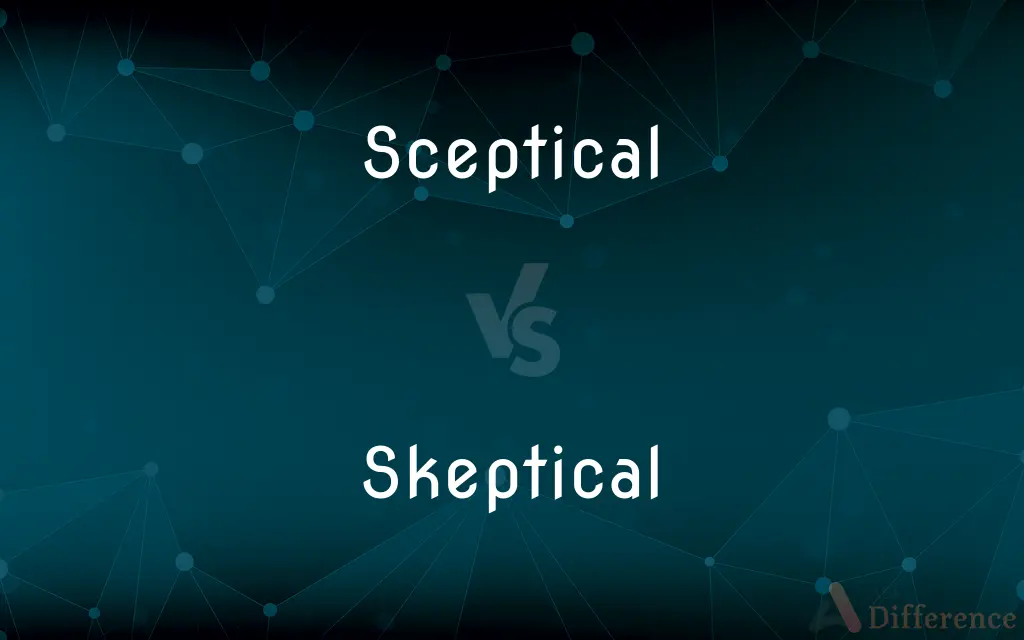Sceptical vs. Skeptical — What's the Difference?
By Tayyaba Rehman — Updated on May 16, 2024
Sceptical and Skeptical both mean having doubts or reservations, but "sceptical" is preferred in British English, while "skeptical" is used in American English.

Difference Between Sceptical and Skeptical
Table of Contents
ADVERTISEMENT
Key Differences
Sceptical and Skeptical essentially have the same definition, expressing doubt or a questioning attitude. The only difference between sceptical and skeptical is regional preference: "sceptical" is commonly used in British English, while "skeptical" is the preferred spelling in American English. Both words convey the same sentiment: a lack of conviction or certainty.
The term Sceptical is part of British English and tends to follow other British spelling conventions that retain a 'c', like in 'practise' (verb form) or 'defence'. Skeptical, on the other hand, aligns with the American English tendency to simplify spellings, paralleling changes like 'color' from 'colour' or 'center' from 'centre'. Despite these orthographic differences, sceptical and skeptical serve the same function in a sentence.
When one says they are sceptical, it means they harbor doubts or are not easily convinced. If someone is described as skeptical, it implies they approach claims with scrutiny and demand evidence. Whether one uses sceptical or skeptical may also signal to the reader the author's linguistic background or the intended audience's dialect.
Regardless of whether one chooses sceptical or skeptical, the connotation is that of questioning and analytical thinking. The choice between sceptical and skeptical does not alter the nature of the sentiment conveyed, and in international contexts, both spellings are generally understood. The preference for one over the other is primarily a matter of spelling conventions rather than any difference in meaning or usage.
Comparison Chart
Spelling
British English spelling
American English spelling
ADVERTISEMENT
Pronunciation
Pronounced with a soft 'c'
Pronounced with a hard 'k'
Region of Usage
Preferred in the UK, Commonwealth, and other regions
Preferred in the United States
Associated Dialects
Aligns with British English dialects
Aligns with American English dialects
Grammar
Same grammatical usage as skeptical
Same grammatical usage as sceptical
Compare with Definitions
Sceptical
Reluctant to accept certain assertions without solid evidence.
Scientists are naturally sceptical of unproven hypotheses.
Skeptical
Marked by or given to doubt; questioning.
She gave a skeptical look when she heard the explanation.
Sceptical
Having reservations about a certain idea or proposal.
Investors were sceptical about the new company's profitability.
Skeptical
Showing doubt or a lack of belief.
The scientist was skeptical about the new data.
Sceptical
Doubtful about a particular thing.
She was sceptical about the project's chances for success.
Skeptical
Inclined to skepticism in all things.
He was skeptical about the latest diet fad.
Sceptical
Showing an attitude of doubt towards theories or beliefs.
He remained sceptical of the existence of extraterrestrial life.
Skeptical
Not easily convinced; having doubts or reservations.
I'm skeptical about the effectiveness of the new drug.
Sceptical
Questioning the validity or authenticity of something.
The jury was sceptical of the witness's testimony.
Skeptical
Marked by or given to doubt; questioning
Skeptical of political promises.
Sceptical
Marked by or given to doubt; questioning
Skeptical of political promises.
Skeptical
Relating to or characteristic of skeptics or skepticism.
Sceptical
Relating to or characteristic of skeptics or skepticism.
Skeptical
Having, or expressing doubt; questioning.
My teacher was skeptical when I told her my dog ate my homework.
Tom was skeptical when Paul told him that he saw Bigfoot.
Sceptical
Variant of skeptic.
Skeptical
Of or relating to philosophical skepticism or the skeptics.
Sceptical
Standard spelling of skeptical
Skeptical
Denying or questioning the tenets of especially a religion;
A skeptical approach to the nature of miracles
Sceptical
Marked by or given to doubt;
A skeptical attitude
A skeptical listener
Skeptical
Marked by or given to doubt;
A skeptical attitude
A skeptical listener
Sceptical
Denying or questioning the tenets of especially a religion;
A skeptical approach to the nature of miracles
Skeptical
Relating to the theory that certain knowledge is impossible.
The philosopher's approach was skeptical in nature.
Common Curiosities
Are there any words that rhyme with sceptical/skeptical?
Both words have few rhymes; 'ethical' might be a slant rhyme.
Can either sceptical or skeptical be used in formal writing?
Yes, but match the spelling to the regional standard of your audience.
Does being sceptical/skeptical mean someone is cynical?
No, scepticism involves doubt and questioning, not necessarily cynicism.
Can businesses be sceptical/skeptical?
Yes, businesses can exhibit scepticism/skepticism towards proposals.
Do sceptical and skeptical have the same etymology?
Yes, they both derive from the Greek word "skeptikos."
Are sceptical/skeptical views common in science?
Yes, scepticism/skepticism is a fundamental part of the scientific method.
Are sceptical and skeptical interchangeable?
Yes, they are interchangeable but used in different regions.
Do sceptical/skeptical have antonyms?
Yes, antonyms include credulous, gullible, and unquestioning.
Is scepticism/skepticism always considered negative?
No, it's often seen as a critical thinking skill.
Can someone be sceptical/skeptical about positive news?
Yes, people can be sceptical/skeptical about anything, even good news.
Is there a noun form for sceptical/skeptical?
Yes, the noun form is scepticism/skepticism.
Can one be too sceptical/skeptical?
Excessive scepticism/skepticism can lead to dismissing valid information.
How do I know whether to use sceptical or skeptical?
Choose based on the version of English you are using: UK or US.
Is there an adjective form for scepticism/skepticism?
The adjective forms are sceptical/skeptical.
Can children be taught to be sceptical/skeptical?
Yes, teaching children to question and think critically is possible.
Share Your Discovery

Previous Comparison
Feed vs. Fed
Next Comparison
Ingest vs. DigestAuthor Spotlight
Written by
Tayyaba RehmanTayyaba Rehman is a distinguished writer, currently serving as a primary contributor to askdifference.com. As a researcher in semantics and etymology, Tayyaba's passion for the complexity of languages and their distinctions has found a perfect home on the platform. Tayyaba delves into the intricacies of language, distinguishing between commonly confused words and phrases, thereby providing clarity for readers worldwide.
















































